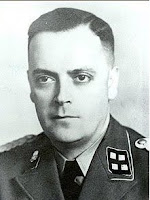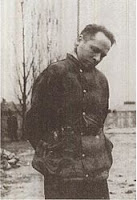My theory is that the people have a collective soul that is inherited through generations, instilled by mothers, grandmothers and relatives who make a people more hard-working, more studious or more cruel than others.
The theory that the Nazis led by Hitler were paratroopers who fell on a peaceful and music-loving people are mere hoaxes. Given the collective amnesia suffered by the Germans who perpetrated the genocities they committed on what happened, barely softened by some official statements and with a silence that reaches new generations, it is necessary to examine the past to see the origin of the cruelty of the German people, including Austria of course.
In the future we will talk about the behavior of the Germans in their colonies or even their behavior in America when some went with the Spanish soldiers as they had the same emperor. Now we will talk about a little known aspect, his collaboration with the Turks in the Armenian genocide.
In his article "Today’s Turkey continues the Armenian genocide"
https://www.voltairenet.org/article187587.html,
Thierry Meissan said :
The declarations of President Gauck
By recognising
German « co-responsibility, and even, potentially, complicity » in the 1915
massacres, German President Joachim Gauck lifted the taboo concerning the
continuance of the crime, and he did so with even more courage considering the
strong Turkish presence in Germany and the absence of an Armenian electorate.
An exemplary officer, Rudolf Höß acquired skill in
matters of genocide in Turkey, during the 2nd Reich. He then became the
director of the Auschwitz camp during the 3rd Reich.
Historians
established the role of the German delegation in the genocide a long time ago.
The orders of deportation signed by the Ottoman Vice-Chief of Staff, German
general Fritz Bronsart von Schellendorf, have been published. The German Empire
of William II had already tested genocide by exterminating the Hereros and the
Namas in South-West Africa (now Namibia) in 1905. The German officers who
observed and sometimes participated in the genocide of non-Muslims in Turkey
put their skills to use during the Nazi régime. For example, this was the case
for Rudolf Höß - his father participated in the genocide of the Hereros in
1905, as he did himself with the Armenians in 1916. He then became the
commandant of the camp of Auschwitz from 1940 to 1943, where he massacred Jews,
gypsies and Slavs.
In order to
understand and prevent genocides, we must not study them from the point of view
of the victims, but by correctly understanding the point of view of the
executioners.
Until now, we have belived, wrongly, that the Young Turks and the Nazis were the only ones responsibles for the Armenian and Jewish genocides. But History shows us that the ideologies which led to these crimes were shared by others, before and after them, who also attempted to perpetrate them. Contrary to what we might imagine, there is no example of a genocide which was accomplished in a single operation, nor against a single population. These crimes continue for a very long time, and always concern several ethnic groups. It is therefore essential to condemn the first massacres, and to condemn the underlying ideologies in order to prevent the continuance of genocides.
Friedrich (Fritz) Bronsart von Schellendorf He was the chief of Staff of the Ottoman Army, part of German military mission in the Ottoman Empire. . He was instrumental drafting initial war plans for the Ottoman Army. He is "depicted as the actual initiator of the scheme of the Armenian Genocide". He was an ardent supporter of Hitler during 1930s also.
Role during the Armenian Genocide (*)↑
 |
| Friedrich (Fritz) Bronsart von Schellendorf |
Because of the question of his involvement in the genocide of Armenians, Bronsart von Schellendorf attracted increased attention in recent historiography . In his controversial study of the role of German officers in the Armenian genocide, Vahakn Dadrian identified Bronsart von Schellendorf’s direct complicity, even seeing him as an instigator. Recent research has questioned this accusation. Bronsart von Schellendorf was willing to accept the Turkish measures of violence against the Armenians and took the anti-Armenian view of the Young Turks . But, as Isabel Hull has pointed out, he was primarily guided by “military necessity”. Under this premise, he agreed to the deportation of Armenians from the border areas to Russia, focusing solely on his military responsibilities. Behind the phrase “military necessity” was the strong mistrust of the Armenian population in the hinterland of the front. Fearing a possible
Armenian uprising, German officers like Bronsart von Schellendorf, and Colmar Freiherr von der Goltz (1843-1916), supported a deportation of the Armenian population. At the same time, Bronsart von Schellendorf did not intend to destroy the Armenians. Nevertheless, by supporting the deportation plan he accepted the risk of Armenians being killed in the deportation. Thus, he was involved in the genocide planned and undertaken by the Young Turks. But even when the genocidal intention of the Turks became unmistakable, Bronsart von Schellendorf was not willing to distance himself from their actions or even to intervene, as other German officers such as Colmar von der Goltz or Otto Liman von Sanders did. Moreover, after the First World War, he repeatedly defended the Young Turk leadership in newspaper articles. In an article in the Deutsche Allgemeine Zeitung of July 24, 1921, on the occasion of the trial of the Talat Pasha (1874-1921) murderer, he attempted to justify the Turks and himself by explaining that the death of the Armenians was only the effect of the inability of the Turks to carry out an orderly deportation. In doing so, he not only drew on widespread images of well-organised Germans and disorganised Orientals, but also denied the Young Turks’ intention of destroying the Armenians. Thus, together with a number of other former German officers (including Hans Humann (1878-1933), he contributed towards the denial of the murder of the Armenians. The motive for this behavior was partly due to a continued loyalty to the Turks and partly to a fundamentally defensive attitude against all allegations of the Entente regarding German involvement. In the case of Bronsart von Schellendorf, there was direct personal involvement as Ottoman chief of staff.




No comments:
Post a Comment